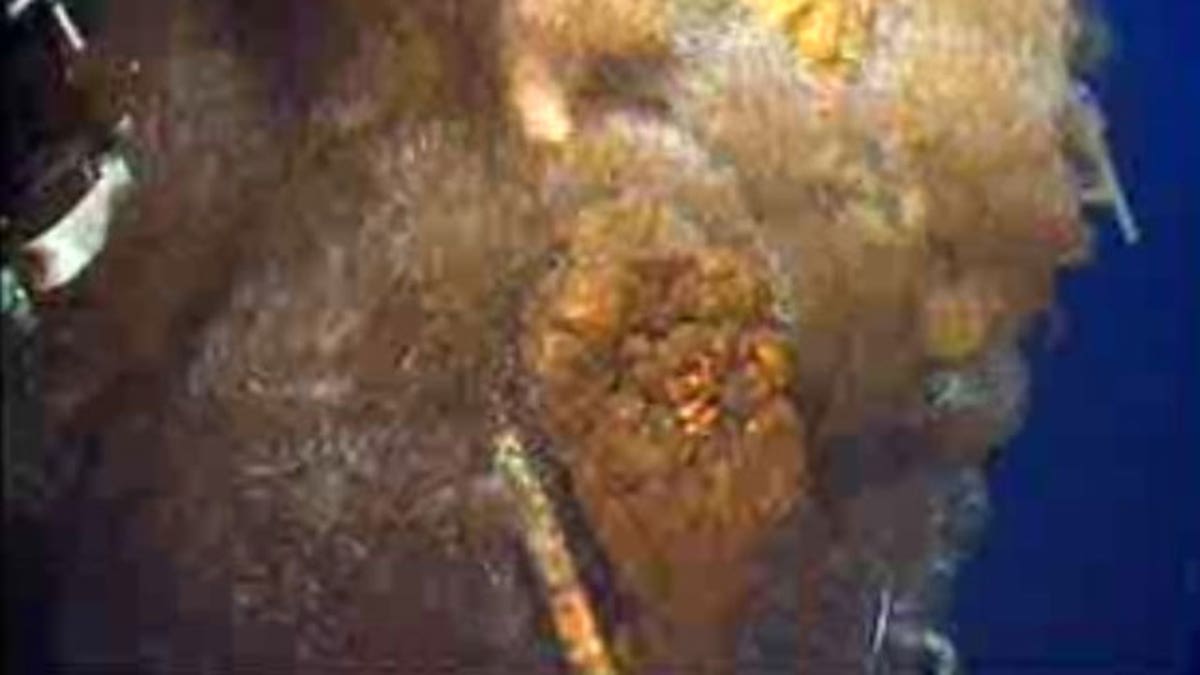
June 23: This image from video provided by BP PLC early Wednesday morning shows oil continuing to gush millions of gallons a day, from the broken wellhead, at the site of the Deepwater Horizon oil well in the Gulf of Mexico. (AP)
NEW ORLEANS -- Tens of thousands of gallons more oil gushed into the Gulf of Mexico on Wednesday after an undersea robot bumped into the cap that had been containing some of the crude, forcing BP to remove it. Officials told Fox News that they expect to reattach the cap by late Wednesday evening.
The setback, yet another in the nine-week effort to stop the gusher, came as the Obama administration tried to figure out how to resurrect a six-month moratorium on deepwater drilling and thick pools of oil washed up on beaches in Florida.
Removing the containment cap meant about 29,000 extra gallons of oil an hour were spewing, based on the record amount that had been captured in the previous 24 hours. Under the current worst-case scenario, as much as 104,000 gallons an hour -- 2.5 million gallons a day -- is flowing when there are no devices stopping some of it.
The robot bumped the cap just before 10 a.m. Wednesday, sending gas rising through a vent that carries warm water down to prevent ice-like crystals from forming inside it, Coast Guard Adm. Thad Allen said.
Crews were checking to see if crystals had formed before putting the cap back on. BP spokesman Bill Salvin could not say how long that might take.
"We're doing it as quickly as possible," he said.
A similar problem doomed the effort to put a bigger containment device over the blown-out well in May. BP had to abandon the four-story box after the crystals called hydrates clogged it, threatening to make it float away.
The smaller cap, which had worked fine until now, had been in place since early June and was sucking oil up to a ship on the surface. To get it there, though, crews had to slice away a section of the leaking pipe, meaning the flow of oil could be stronger now than before.
Before the problem with the cap, it had collected about 700,000 gallons of oil in 24 hours. Another 438,000 gallons was burned on the surface by a different system that was not affected.
Anywhere from 67 million to 127 million gallons has spilled since the April 20 explosion on the Deepwater Horizon rig that killed 11 workers and blew out the well 5,000 feet underwater. BP PLC was leasing the rig from owner Transocean Ltd.
The Obama administration was plotting its next steps Wednesday after U.S. District Judge Martin Feldman in New Orleans overturned a moratorium on new drilling, saying the government simply assumed that because one rig exploded, the others pose an imminent danger, too.
Feldman, appointed by President Ronald Reagan in 1983, has reported extensive investments in the oil and gas industry, including owning less than $15,000 of Transocean stock, according to financial disclosure reports for 2008, the most recent available. He did not return calls for comment on his investments.
The White House promised an immediate appeal of his ruling. The Interior Department imposed the moratorium last month in the wake of the BP disaster, halting approval of any new permits for deepwater projects and suspending drilling on 33 exploratory wells.
Interior Secretary Ken Salazar said in a statement that within the next few days he would issue a new order imposing a moratorium that eliminates any doubt it is needed and appropriate.
"It's important that we don't move forward with new drilling until we know it can be done in a safe way," he told a Senate subcommittee Wednesday.
Several companies, including Shell and Marathon Oil, said they would await the outcome of any appeals before they start drilling again.
Asked about it Wednesday on NBC's "Today" show, BP managing director Bob Dudley said his company will "step back" from the issue while it investigates the rig explosion.
BP said Wednesday that Dudley has been appointed to head the new Gulf Coast Restoration Organization, which is in charge of cleaning up the spill. He takes over from BP CEO Tony Hayward, who has been widely criticized for his handling of the crisis.
In Florida, thick pools of oil washed up along miles of national park and Pensacola Beach shoreline as health advisories against swimming and fishing in the once-pristine waters were extended for 33 miles east from the Alabama/Florida border.
"It's pretty ugly, there's no question about it," said Gov. Charlie Crist, who toured Pensacola on Wednesday morning.
The oil had a chemical stench as it baked in the afternoon heat. The beach looked as if it had been paved with a 6-foot-wide ribbon of asphalt, much different from the tar balls that washed up two weeks earlier.
"This used to be a place where you could come and forget about all your cares in the world," said Nancy Berry, who fought back tears as she watched her two grandsons play in the sand far from the shore line.

